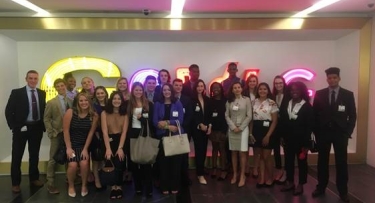Summer Leadership Academy Inspires Future Business Leaders

This summer, the Mercy School of Business’s Leadership Academy welcomed high school students from across the country for four separate, weeklong sessions. The program — which is in its sixth year — helps rising high school seniors develop their leadership and public speaking skills by immersing them in experiential learning. More than 20 percent of the Leadership Academy participants end up attending Mercy, many in the respected Business Honors Program.
“The Leadership Academy was definitely not what I was expecting, but I came to learn that nothing at Mercy is quite what you were expecting — all in the best way possible,” reflected John Flickinger ’17, a Mercy alumnus who attended the Leadership Academy in 2013 and graduated from the Business Honors Program. In one of the most memorable activities of the Leadership Academy, students are asked to give speeches both at the beginning and end of the week. “For me, presenting was up there as one of my biggest fears. After my presentation, I met with the director of the Business Honors Program, and he coached me through a couple of different things that I could improve upon. That's what initially sparked my interest in [applying to] Mercy College. Having this instructor who had all of this experience sitting down and talking to me really made me feel like a person he really cared about.”
“Those last-day speeches … I still remember mine,” said Mallory Crandlemire, who attended the Leadership Academy in 2014 and is currently a senior in the Business Honors Program. “In those five days [at the Leadership Academy], I felt so connected to all the students and to all the professors that I felt comfortable talking about a really emotional and really personal story — and so did a lot of other students at the academy. It was one of the most amazing experiences.”
High school students travel from across the country every summer to join accomplished, driven peers at the Leadership Academy for five full days of learning. They live in the dorms and eat in the cafeteria, truly experiencing a week in the life of a Mercy undergraduate. In keeping with Mercy’s mission to make education accessible and affordable, the program costs just $300, which covers the cost of food. The professors even volunteer their time. “What I get out of it is a tremendous joy and gratitude in helping people transform their lives,” explained Professor Mark Chmiel, Consumer Marketing.
On the first day of the Leadership Academy, after introductory remarks, every student gives a speech to the group. In addition to helping the professors gauge students’ skills and mindsets , this exercise sets up some transformational learning about public speaking and leadership. “I'm obsessive about teaching our students the ability to speak in such a way that others want to listen and then listen in such a way that others want to speak to you,” explained Chmiel. “The really great businesspeople — the ones who assume the leadership positions — are often not just technically competent, but they are particularly compelling and powerful communicators. Right from the get-go, we help [students] to develop the mindset that being a good businessperson goes way beyond your transcript and your GPA. It has to do with the way you behave, the example that you set and the way you communicate — can you inspire, persuade, provoke, motivate, and move people closer to your cause?”
Over the next several days, students hear from subject matter experts about various career paths in business, including entrepreneurship, finance, accounting and marketing. They visit a company in New York City — such as Google, Marks Paneth, Disney, LinkedIn, or Ernst & Young — and met both employees who are just starting out in their careers and others who are senior leaders. Flickinger still remembers his corporate visit to Bloomberg: “Touring that building, meeting with different employees who work there, and really starting to understand what it's like to work in New York City and what it’s like to work in a very large corporate business … Bloomberg is a really incredible company. And you got to see that through the way that the building was designed all the way to the love and passion from every speaker we met with.” Students also learn softer skills about cooperation and perseverance as they hike up Bear Mountain.
On the last day of the Leadership Academy, students give another speech. Dzifa Amexo — who attended the Leadership Academy in 2016 and is currently a Mercy freshman in the Business Honors Program — remembers her final speech vividly: “I talked about how before I came to the Leadership Academy, I was a very shy person. But on the inside, I was a true extrovert. The Leadership Academy awakened the extrovert in me, and I learned that it's OK to be myself. It was one of the best speeches I've ever given in my life.”
Chmiel explains, “The difference between what they said on Monday and everything they bring into their speech on Friday is like going from zero to 60 miles an hour. It is unbelievable. The confidence, the gravitas, the enthusiasm. Lucas Gladstein, a student entering his junior year in fall of 2018 says, ‘This is really cool! I didn’t know that it could be like this.’ That's when they begin to think that we’re onto something here [at Mercy].”
Indeed, of the approximate 200 students who attend the Leadership Academy every summer, on average 40 decide to attend Mercy as undergraduates. The Leadership Academy provides a taste of a Mercy undergraduate’s life in the unique Business Honors Program, which is grounded in experiential learning and real-world application. Students intern at companies early in their college years, run student businesses, manage a $100K student fund and consult on real projects for real companies. All the professors are successful businesspeople who came to Mercy to give back after experiencing how their own college educations were “utterly disconnected from the world we entered into,” explained Chmiel. He says that a current student describes the Business Honors Program not as a college program at all but as a professional boot camp that prepares students for the day they enter the workforce. This is exactly the goal.
“The Leadership Academy was developed to help brand our model of education for the benefit of those who want this model of education,” said Chmiel. “It doesn’t speak to everybody. Some want Harvard and Yale. But for others, when they see this model, they think, ‘Wow, this really speaks to me.’ We know other schools may not look like us, but that's exactly our point.”
“We don’t expect all academy students to come to Mercy,” emphasizes Ms. Genie Macchiarelli — Operation Manager of the Summer Leadership academies — though exposing students to the Business Honors Program is certainly a goal of the Leadership Academy. “We do hope that they gain a new lens when looking for colleges, like looking for programs with opportunities to do internships and consulting projects early on, to work with real companies. We give them a framework so they can start looking critically at [other colleges’] programs.”
But for many — like Crandlemire, Flickinger, Gladstein and Amexo — Mercy’s unique educational model is exactly what they wanted. For Crandlemire, the one-on-one coaching with the professors “really resonated with me. I was looking at some bigger schools, but after seeing the small class sizes and seeing these relationships that you have with the professors, it was hard to say no to [Mercy’s Business Honors] Program.” She explains that after spending most of a recent semester away from campus while working full time as an intern, “the first thing I wanted to do [on campus] was go check in with the professors because I hadn't gotten to see them much all semester.”
Flickinger also discussed the importance of the relationships in making his experience meaningful: “I felt like a person when I walked into [Mercy]. I had a family surrounding me and encouraging me to become my best self. At some other schools, I ended up getting a little bit lost in the crowd, and I felt like more of a number. … When I walked into Mercy, I felt like a person.” He credits the skills he gained at Mercy with helping him feel confident and stand out among his peers at Unilever, where he now works as a financial analyst. He describes a recent meeting in which he had only five minutes to give a 20-minute presentation. Because of his training at Mercy, he was able to adapt in the moment and deliver a presentation that earned praise from senior leaders. “If I'd tried to do the same thing five years ago before I attended Mercy, my face would have turned really red and I would've gotten super nervous, and I wouldn't have known what to do.”
The Leadership Academy is only one week in one summer, but it can develop students’ skills, shape their ideas and even guide their futures. The Leadership Academy inspired Amexo to pursue a career in finance and attend Mercy College. By the following spring, she said, “I had my Mercy sweatshirt, and all my friends kept asking, ‘What’s Mercy College? Why Mercy?’ And I’d say, ‘This one week in the summer changed my whole entire life.’”
For more information on next year’s Leadership Academy, email LeadershipAcademy@mercy.edu or call 914-674-7482


